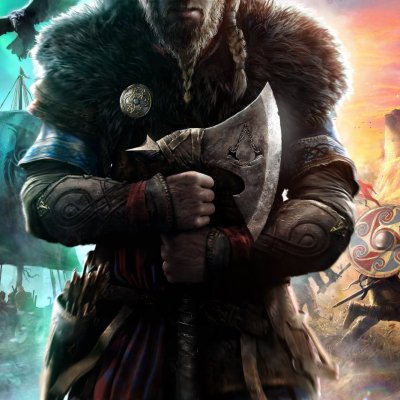Assassin’s Creed Valhalla: Who is King Alfred?
Here's what you need to know about the likely villain of Assassin's Creed Valhalla: the legendary King Alfred.

The debut trailer for Assassin’s Creed Valhalla revealed quite a bit about the upcoming game but also left us with questions regarding the game’s setting, characters, time period, and mythology.
Yet, there is one character in the trailer who seems to have generated more discussion than any other. He’s the King who openly declares war on the Vikings and denounces their efforts to conquer England. Ubisoft has confirmed that he is King Alfred of Wessex, the real-life monarch who is positioned to be the primary antagonist of Assassin’s Creed Valhalla.
Who was King Alfred, though? Where does he fit into the game’s plot, what does his presence tell us about Valhalla‘s setting and era, and, maybe the most important question of all, is he really the villain of the upcoming game? In order to answer some of these questions, we took a look at the legacy of the real King Alfred in order to give you a better idea of who he was and what role he’ll play in the upcoming sequel.
Æthelwulf, King of Wessex – King Alfred’s Father
Æthelwulf ruled as the King of Wessex from around 839 to 858. He was a somewhat controversial ruler who was praised for his generosity (he once gave away a great deal of his personal property and wealth to the subjects of the kingdom) and how much his kingdom flourished under his reign. However, others criticized him for his sometimes excessive religious devotion. In fact, he went on a long pilgrimage to Rome that caused a kind of power vacuum in his kingdom.
During the time of Æthelwulf’s reign, he was generally praised for holding back the Viking hordes and defending his people. However, most historians agree that the Viking attacks during that time were not nearly as prevalent as they would be during the reigns of Æthelwulf’s sons.
Æthelberht, Æthelbald, and Æthelred I – King Alfred’s Brothers
It was actually highly unlikely that King Alfred would ever become king at all considering that he had three brothers who were ahead of him in the line of succession: Æthelberht, Æthelbald, and Æthelred I.
Æthelbald’s reign began before the death of Æthelwulf in 858. It was actually Æthelbald who caused that aforementioned power vacuum when Æthelwulf left on his pilgrimage to Rome. He refused to give up control when Æthelwulf returned, and the kingdom was formally divided in order to avoid a drawn-out conflict.
Following Æthelbald’s death in 860, his brother Æthelberht became King and helped to reunite the kingdoms of Wessex and Kent. It’s believed that the Vikings began invading the kingdom more frequently during Æthelbald’s reign, but such attacks were still largely limited and unorganized compared to what would come.
Æthelberht died in 865 and was succeeded by his brother, Æthelred I. Around the time that he ascended to the throne, the Viking’s infamous Great Heathen Army arrived in England and began its legendary assault on the kingdoms. Unlike previous Viking invaders, this army was massive in size and much better at conquering territory.
The Great Heathen Army’s early victories weren’t exactly total (Æthelred I personally led some victories against them), but the extent of their success was shocking and largely unprecedented. They were seen as enough of a threat to the kingdoms that some began to wonder whether or not it was better to side with the Vikings. Æthelred I left behind a relatively positive legacy when he died in 871, but he had also failed to repel the Great Heathen Army’s invasion by the time of his death.
King Alfred’s Reign and War Against the Vikings
After his last brother had died, King Alfred inherited a kingdom that was under siege and somewhat divided. His reign was almost entirely defined by the siege of the Great Heathen Army, which seems to be why you see him issue the proclamation of war against the Vikings in the Assassin’s Creed Valhalla trailer.
In fact, it’s likely that Assassin’s Creed Valhalla will specifically take place no earlier than 871 when King Alfred ascends to the throne. This is when the invasion was arguably at its peak and King Alfred would have likely been under the most pressure to defend his kingdom.
So what kind of ruler was King Alfred? Well, some of what we know about him is obviously a bit warped. That’s what happens when most of what is known about a historical figure comes from his own subjects, contemporaries, and religious allies.
Generally speaking, Alfred was seen as a renowned military leader who certainly suffered initial defeats but managed to keep the kingdom together long enough to sustain a successful resistance against the Vikings.
There are actually several records of him striking deals with the Vikings, including a stunning arrangement with the Viking leader Guthrum, who not only surrendered to Alfred but was baptized and became the King’s spiritual son, Æthelstan. It’s possible that Valhalla will cover this event as it not only represents a turning point in the war but touches upon the religious beliefs of the Vikings, which will factor into the game.
Overall, Alfred is known more for his acts of diplomacy and commanding leadership style than particularly shocking acts of violence (even against the Vikings). He’s generally referred to as an incredible leader during times of both peace and war, though much of his reign was defined by a war that he essentially inherited.
This is why things get a bit tricky when it comes to Alfred being portrayed as a straight-up villain in Assassin’s Creed Valhalla. While we have no doubt that the Vikings considered him to be a villain of sorts (especially after Alfred began leading a successful counterattack against their invasion), Alfred himself was not necessarily seen as a cruel man or a particularly violent ruler. Even in historical context, he was really just defending his kingdom against an enemy invasion.
That being said, it’s obvious from his often cited historical name (King Alfred the Great) that Alfred is a heavily romanticized individual whose legacy may be impacted by the fact that history is written by the winners. We imagine that, if the game plans to turn him into more of a traditional villain, it will be by focusing on the religious differences between Alfred and the Viking leaders as well as the influence of the church and the power and actions of Alfred’s descendants. Specifically, it stands to reason that there may be a plot point that reveals he and his family are tools of the Templars.
History indicates that Alfred died in 899 of an unknown disease. He remains the only King of England to have received the epithet of “The Great,” which is believed to have been formally assigned to him sometime in the 16th century.


